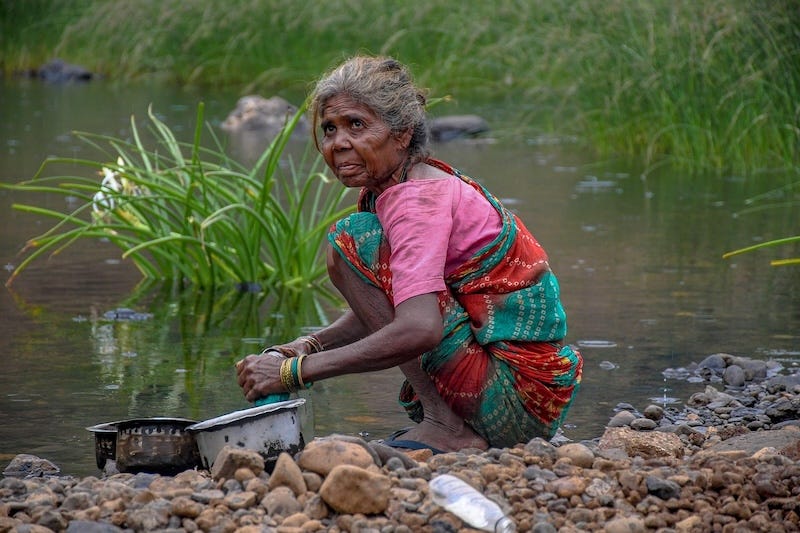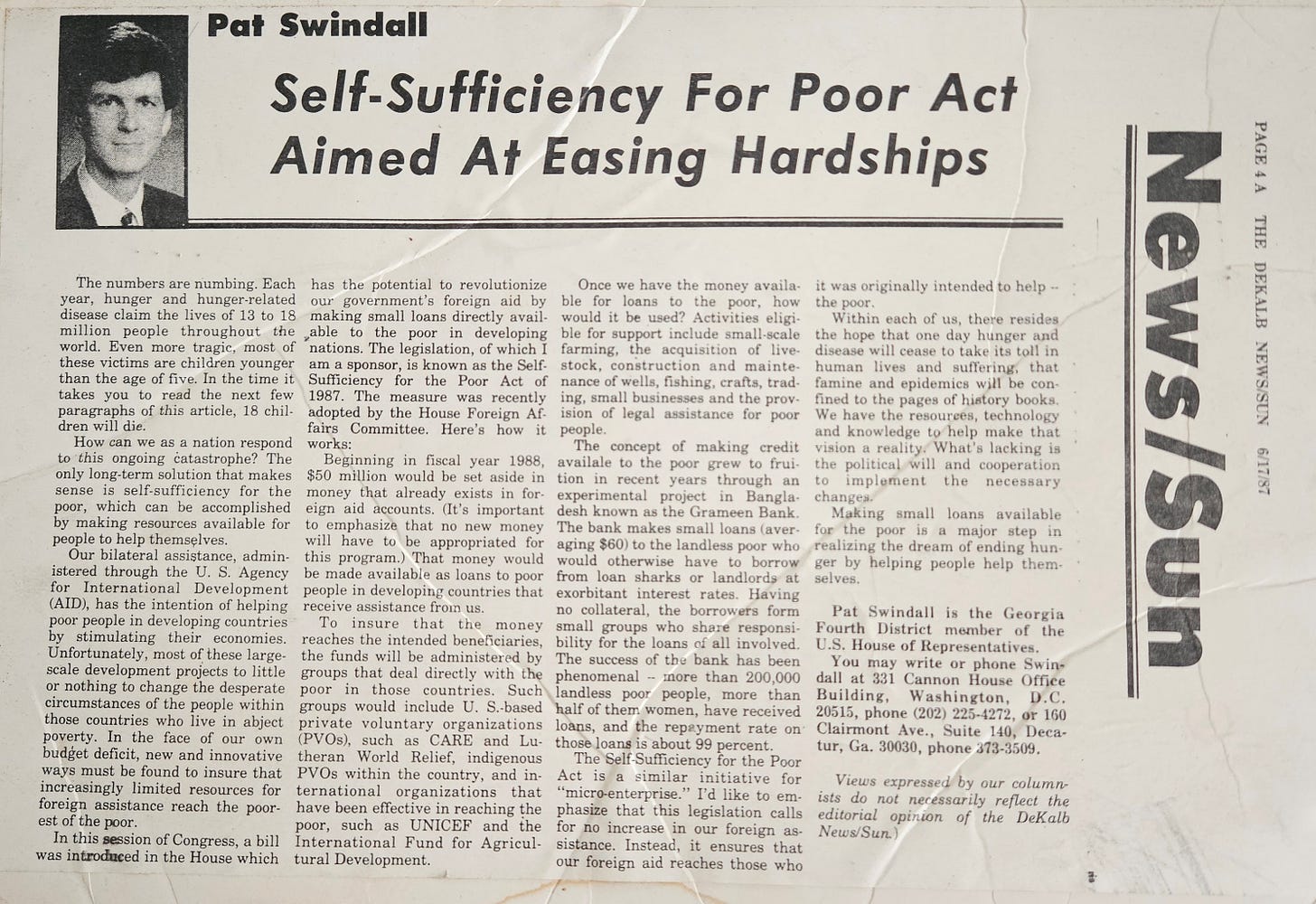It had been about two years since that first disastrous meeting with Republican Congressman Pat Swindall. After engaging him at a number of “Chat with Pat” sessions and building relationship and trust, an opportunity arose to find out just how much progress we had made.
RESULTS had heard about a breakthrough approach to addressing poverty that started in Bangladesh with an economist named Muhammad Yunus. He observed that poor women did not have access to credit at a reasonable rate of repayment. Looking for a loan to, for example, purchase goods that they could resell to make an income, they turned to money lenders charging exorbitant interests that left them with barely enough to feed their families. Their great obstacle to getting credit at a lower interest rate was lack of collateral.

Yunus hit upon the idea of organizing the women into small groups of borrowers who would guarantee each other’s loans. One woman might take a small loan to purchase a sewing machine to make clothes to sell. Another might purchase chickens to produce eggs for sale. The project grew into the Grameen Bank, and microcredit became an exciting tool to help people work their way out of poverty.
In 2006, Yunus would win the Nobel Peace Prize for developing this revolutionary concept, but 20 years earlier microcredit was a solution few people had heard of. RESULTS volunteers spread the word about it with editorial boards and congressional offices, and in 1987 legislation was introduced to fund microcredit programs through U.S. foreign aid. The bill was titled the Self-Sufficiency for the Poor Act.
To build momentum for the legislation, RESULTS launched a campaign to get 100 cosponsors, both Republicans and Democrats. It was time for us to schedule another face-to-face office meeting with Pat Swindall and ask him to put his name on the bill.
I felt optimistic going in, because in one of our “Chat with Pat” sessions, we had educated him about microcredit in Bangladesh. He was intrigued and receptive to the idea of people getting loans to start or expand small enterprises to lift themselves out of poverty. It appealed to the bedrock value he and other conservatives held about personal responsibility. The money was used for “a hand up, not a handout.”
During the car ride to Swindall’s district office, our delegation of four went over our agenda and the roles each of us would play in the meeting — facilitator, note taker, delivering a short “laser talk” about microcredit, making “the ask” about cosponsoring the bill. I would be the one making the request to cosponsor, but I had an additional request if the answer was “yes.”
“Our chats with Pat have gone really well,” I said to our group. “I feel pretty confident he’s going to say yes to cosponsoring the bill, and when he does, I’ll ask him if he’d be willing to publish an op-ed about why he’s supporting the bill. I could offer to provide a draft.”
“I don’t know, Steve,” my wife, Sara, said. “You might be pushing your luck.”
“What have I got to lose? He’s not going to change his mind about cosponsoring because I ask him about doing an op-ed. In for a penny. In for a pound.”
We arrived at Swindall’s office carrying a television and a VHS player to show a short video about microcredit. When it came time to show it, Pat sat atop his desk with his knees tucked under his chin, giving the mini-documentary his rapt attention. Everyone in our team performed their roles perfectly, and finally it was time to make the big request.
“Pat, there’s a bill introduced in the House, the Self-Sufficiency for the Poor Act, that would authorize funding for microcredit programs like the Grameen Bank. Would you be willing to cosponsor this legislation?”
We held our breath for the brief moment it took for him to respond and nearly fell out of chairs when he told us, “I’d be delighted to cosponsor this bill.”
I couldn’t believe what had just happened. Members of Congress are usually more cautious on requests for sponsoring legislation, especially if they haven’t SEEN the bill. The expected response is usually, “I’ll have my staff take a look at it and we’ll get back to you.” But Pat trusted us so much that, going only on what we had told him and with no hesitation at all, he was willing to put his name on the legislation.
My head was swimming at this point, and I nearly forgot that I had an additional request about publishing an op-ed. The words were forming in my mouth when Pat spoke up and beat me to the punch.
“You know, this is such a great idea. It’s something that the public should really know about. I have a column that runs every two weeks in the DeKalb News/Sun. Would y’all be able to draft a piece about this? You can give it to my staff. They’ll look it over, and we’ll run it as my next column. What do you say?”
I turned to my wife with a smile so wide it hurt, and then replied, “Pat, that’s a great idea.”

My feet never touched the ground as we left the office and walked to the car, a sense of euphoria hanging over us. Two years prior, Pat Swindall was one of a handful of congressmen who voted to deny famine relief to Ethiopia, and now I was ghostwriting for him as he joined in sponsoring the first legislation to fund an innovative approach to eliminating poverty.
It was quite an epiphany. Until then, I had relished playing the role of the angry young man, calling out those who I deemed to be wrong. From that day forward, I realized that if I wanted to make a difference, I had to let go of being right. Being right is the obstacle to having meaningful conversations that lead to solving our greatest problems.
There are times when we must hold people accountable for disappointing us, but in most instances an approach of appreciation and respect can be the start of a productive engagement. Citizens’ Climate Lobby makes appreciation a part of meetings with members of Congress — item one on the agenda, in fact.
Letting go of being right also involves letting go of something else — our cynicism. It’s not an easy thing to do. Being a cynic relieves us of the responsibility for actually taking action. It’s our excuse to shy away from doing the hard things that require an investment of time and energy. Yes, we risk failure every time we commit to changing things that shouldn’t be, like hunger, poverty and climate change. But that’s a risk worth taking.


Not just an excellent piece Steve but excellent job getting money into the hands of those who desperately need it.
I will quibble with just one line when you said that the republicans like it when: "The money was used for “a hand up, not a handout.” They don't mind as long as it isn't them financing the "Hand Up." They always use other peoples money.